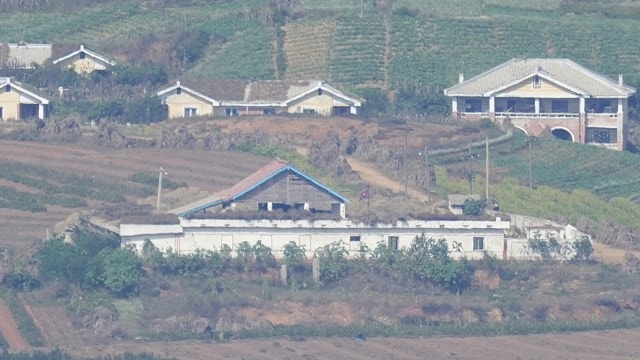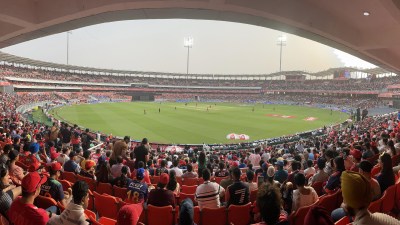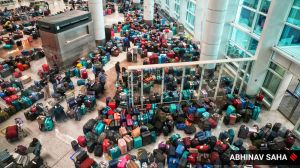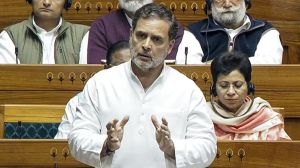Stay updated with the latest - Click here to follow us on Instagram
North Korea to seal border with South Korea, strengthens military defense
The North Korean military stated it will “completely cut off roads and railways” linked to South Korea, along with plans to strengthen defense installations along the border.
 A North Korean flag is seen in North Korea's town Kaepoong, seen from Paju, South Korea. (AP Photo)
A North Korean flag is seen in North Korea's town Kaepoong, seen from Paju, South Korea. (AP Photo)In a significant escalation of hostilities, North Korea announced on Wednesday that it will permanently seal its border with South Korea and bolster front-line defense structures in response to what it termed the “confrontational hysteria” exhibited by South Korean and US forces. This declaration comes amid expectations of a constitutional revision that would officially designate South Korea as North Korea’s principal enemy and redefine its national borders, although such changes were not explicitly confirmed.
Border closures and military reinforcements
The North Korean military stated it will “completely cut off roads and railways” linked to South Korea, along with plans to strengthen defense installations along the border. According to the state-run Korean Central News Agency (KCNA), these measures are framed as “self-defensive” actions aimed at deterring war and protecting North Korean security. The military cited various joint military exercises in South Korea, the deployment of US strategic assets, and escalating hostile rhetoric as provocations necessitating these defensive steps.
South Korea’s response
In response, South Korea’s military asserted it would not tolerate any attempts by North Korea to alter the status quo. A military statement emphasized that South Korea would “overwhelmingly punish” any provocations from the North, reiterating that North Korea’s advancing nuclear and missile programs pose significant threats to peace on the Korean Peninsula.
South Korean officials have noted that North Korea has been strengthening its military posture since April, including the addition of anti-tank barriers and enhanced road fortifications, ostensibly to secure its borders and discourage defections to the South. A report from South Korea’s Unification Ministry indicated that North Korea has been dismantling ties along its side of the cross-border railways and planting mines in the border area.
Constitutional changes and territorial claims
The Supreme People’s Assembly of North Korea convened earlier this week for a two-day meeting to discuss legal amendments concerning the ages of citizens for work and voting. However, it did not disclose whether this session addressed leader Kim Jong Un’s earlier directive to amend the constitution to eliminate the goal of peaceful reunification and formally identify South Korea as the North’s “invariable principal enemy.” Observers have speculated on whether North Korea might assert new territorial claims in waters currently under South Korean control, especially given the history of naval skirmishes in the poorly defined western sea boundary.
Experts have suggested that North Korea may have delayed announcing constitutional revisions due to their sensitivity. Kim’s earlier order signified a departure from his predecessors’ aspirations for reunification on terms favorable to the North, raising questions about his intentions. Analysts suggest that Kim aims to reduce South Korea’s influence in the regional nuclear dialogue and may seek direct engagement with the US Additionally, he may be attempting to diminish South Korean cultural impact and solidify his regime’s authority at home.
Escalating tensions
Tensions on the Korean Peninsula are at their highest in years, exacerbated by North Korea’s ongoing series of provocative weapon tests and increased military drills by South Korea and the US Recently, North Korea conducted a test of a long-range artillery system that poses a direct threat to Seoul, the South Korean capital, located just an hour’s drive from the border.
As North Korea implements these measures and escalates its rhetoric, the implications for inter-Korean relations and regional stability remain uncertain. The situation continues to develop as both Koreas and their allies navigate this increasingly fraught landscape.
(With inputs from The Associated Press)
- 01
- 02
- 03
- 04
- 05































